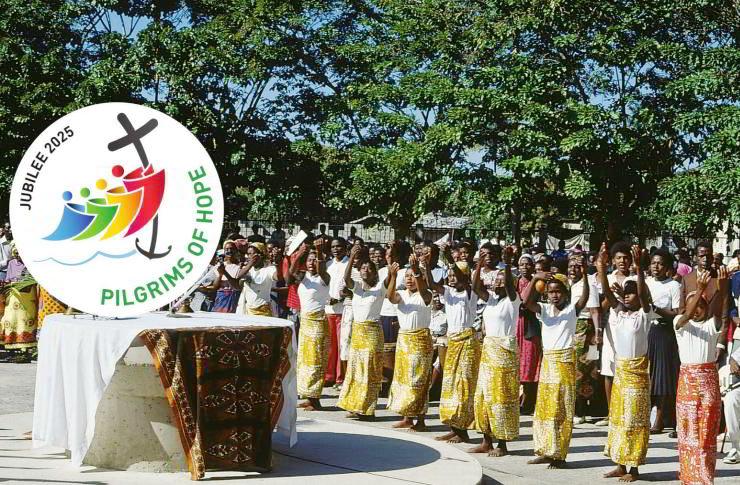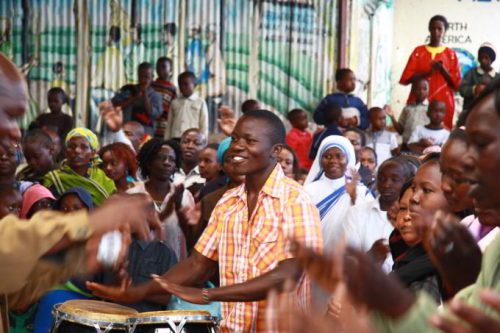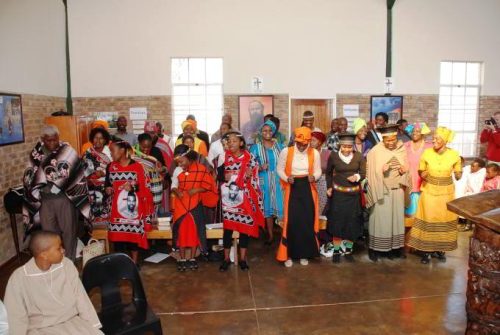The Jubilee Door. A time for re-awakening and sharing.

The jubilee as a time of emancipation and restoration requires including those who need acceptance: not limiting ourselves to the select few who appear most worthy of God’s favour.
The theme that highlights the jubilee inaugurated by Pope Francis on December 24, “Pilgrims of Hope,” intends to highlight, according to the document that preceded the jubilee itself, the importance of sharing a common path that involves everyone.
A jubilee, in other words, is a concrete indicator of a Church in which no one feels excluded; and a place in which we can welcome and communicate the experience of faith and life, in a historical period that appears increasingly characterized by scenarios of competition, conflict and fear, in relationships between individuals and between different peoples. The Church, by vocation, must constantly rethink what it means to be more inclusive.

Kenya. Celebration of the Holy Mass on the outskirts of Nairobi. The Church is called to welcome with open arms those who are different from us. File swm
The American poet, Fred Moten, reflects on the fact that we should always revisit our language and the way we speak to each other. In this sense, the Church has the responsibility to welcome with open arms those who are different from us.
A serious commitment to witnessing Christ among us in the condition and in the real context of good and evil, in which we are immersed. We must also consider that Jesus was not “Christian”; that is, he was not present when we created the ecclesial doctrines that we call “Christian”, that at a certain point, they had come to justify and therefore condone, for example, slavery, or to exclude and marginalize women and in our time to marginalize people of different sexual identities.
The Jubilee must be open to conversations on Africa, still fuelled by poverty, corruption, unrealized dreams, and infinite wounds imposed by a lasting colonial legacy of the West. It means thinking about the negative consequences that our eventual silence causes in the face of any discrimination. We must recognise that a good part of the churches in Africa and those in many other countries are often silent, or remain neutral, concerning political issues, a silence that favours the maintenance of the status quo. The inclusion and integration of all would demonstrate a Church anchored in faith, in a loving God and prophetic action, in which those who live on the margins of society and do not correspond to the laws and doctrines formulated by the Church in other times, have a way to find a place at the table of God’s redemption.

South Africa. The choir sings during mass at a Catholic church in Mamelodi (Pretoria). The Church has the task of skrik wakker (in Zulu, “to awaken”) the love that unites us. File swm
Let us therefore embrace the dimension of Imvuselelo (“awakening” in Zulu) by showing that we are called to celebrate our life as a great family, in which all are included. To use the Afrikaans expression, the Church has the task of skrik wakker (in Zulu, “to awaken”) the love that unites us. Animated by Ubuntu, a spirituality of deep connection: with the vulnerable newborn, the frail elderly, the lonely and depressed, the family destroyed by selfishness and pain, or the person who feels overwhelmed by the difficulties of life and the tragedies of suffering and illness. Inclusion from the perspective of those on the margins of life offers a third space beyond the ‘us versus them’ opposition; an alternative living space to the pursuit of domination or annihilation of the other. It offers the Christian eschatological reality of living immersed in the world while allowing the kingdom of God to sprout and take place in the restoration of the jubilee. (Photo: swm)
Fabian Ashwin Oliver



